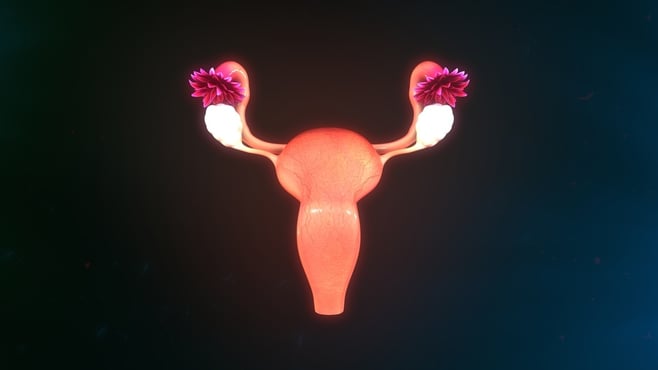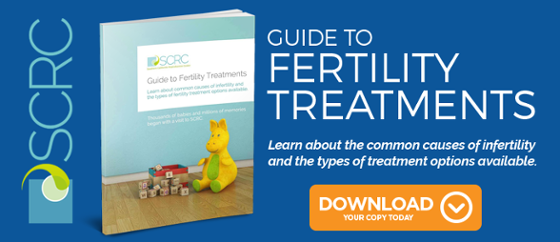 The lining of a woman’s uterus, also called the endometrium, is where a developing embryo implants in the first days of a pregnancy. For women undergoing IVF, the thickness of this lining is very important. The fertility doctor will measure the thickness of the lining before the embryo transfer, to ensure that it is sufficiently thick to allow for implantation. A thick, receptive, nourishing uterine lining is the best possible environment for the embryo, and the ideal lining is at least 7 to 8mm thick and displays a “trilaminar” (or “three layered”) appearance on an ultrasound.
The lining of a woman’s uterus, also called the endometrium, is where a developing embryo implants in the first days of a pregnancy. For women undergoing IVF, the thickness of this lining is very important. The fertility doctor will measure the thickness of the lining before the embryo transfer, to ensure that it is sufficiently thick to allow for implantation. A thick, receptive, nourishing uterine lining is the best possible environment for the embryo, and the ideal lining is at least 7 to 8mm thick and displays a “trilaminar” (or “three layered”) appearance on an ultrasound.
A too-thin uterine lining can be a serious problem in IVF, leading to failed implantation or display irregularity in their lining and early pregnancy loss. There are several reasons why a woman might suffer from a thin lining. Some causes include:
- Estrogen deficiency
- Poor blood flow to the uterus
- Uterine fibroids
- Adhesions or scar tissue in the uterus, caused by trauma or infection
- Hydrosalpinx
- Chronic endometritis (infection of the endometrial cells)
If your doctor determines that there is a specific anatomical issue that could be contributing to a thin endometrium, they may recommend treating the problem before trying to get pregnant. For example, minimally invasive surgery may be used to remove fibroids or repair a hydrosalpinx. In the case of endometritis, a course of antibiotics can help. For other types of problems, treatment usually involves trying supplemental estrogen and taking steps to improve blood flow to the pelvic region.
It is possible for you to become pregnant with a lining that is less than 7 to 8mm thick, but to give you the best chance of success, your doctor might suggest that you attempt to thicken and improve your uterine lining before the embryo transfer procedure. Here are some ways to encourage the growth of your endometrium.
1. Take estrogen supplements.
Your doctor may suggest supplementary estrogen, either through the use of patches, suppositories, or oral pills. This is called “exogenous” estrogen, meaning that extra estrogen is being introduced into your system from the outside. In some cases, a doctor may recommend that you try a rFSH treatment such as Gonal-F to prompt your body to make more of its own estrogen. This is known as “endogenous” estrogen.
2. Focus on blood flow.
In order to grow a thick endometrial lining, the uterus requires a good supply of blood. Improving blood flow throughout your body will improve the blood flow to your pelvic regions, and it is one of the best things you can do to encourage the growth of your endometrial lining.
- Partake in regular, moderate exercise. Most of us have relatively sedentary lives these days, with desk jobs which keep us sitting for hours. During that time, blood flow slows and the reproductive organs are compressed. If you are trying to improve your uterine lining, moving your body is very important. When you raise your heart rate you multiply the number of times that fresh, oxygenated blood flows through your body.
You don’t need to overdo it: high intensity/high-impact exercise isn’t necessary and usually isn’t recommended for women undergoing IVF. But brisk walks, easy bike rides, gentle yoga classes or a half an hour on an elliptical machine at a moderate pace are all great ways to get your blood pumping. You can do this type of exercise every day without putting too much stress on your body.
- Eliminate or limit substances which may restrict blood flow. Caffeine and nicotine are not good for your circulation: you should quit smoking and cut back coffee to one cup a day. Certain seasonal allergy medications and cold remedies which are designed to stop nasal swelling can also constrict your veins. Check with your doctor about which over the counter remedies you should avoid at this time.
- Look into acupuncture. Many women find that a course of acupuncture is helpful at this stage of treatment. Researchers are still investigating the effects of acupuncture on fertility, but there are some studies that suggest it can improve circulation.
- Ask your fertility doctor about Viagra suppositories. While Viagra is usually used to improve blood flow to the penis in cases of erectile dysfunction, it can also be used to encourage blood flow to the female pelvic region through the use of vaginal suppositories.
- Consider your body weight. Women with a low BMI might want to think about gaining a little weight with the help of a nutritionist. Extra weight can promote pelvic blood flow, and fat cells produce additional estrogen. The goal is to have a normal BMI, which ranges from 18.5 to 24.9.
3. Investigate nutritional supplements.
The use of supplements, vitamins, and herbs has not been proven to help thicken the uterine lining, but there are some studies which suggest that some may be helpful. For example, supplemental vitamin E and L-arginine may be associated with improvements in the endometrium, while vitamin D deficiency may play a role in implantation success. Just be sure to do your research and check with your fertility doctor before starting any new supplement.
4. Think about Frozen Embryo Transfer (FET)
The ovarian stimulation cycle and egg retrieval process can be tough on your body and hormones. Some fertility experts suggest that women who have trouble with endometrial thickness might have a better chance of implantation if they freeze the embryos from their IVF cycle and postpone transfer until a month or two later, when their body has had a rest from the fertility medications. FET has a success rate which compares favorably to fresh embryo transfer, and in some cases, taking a break allows the reproductive system to “reset” and lets the body devote its energy to growing a thick endometrial lining.
Reaching the ideal endometrium thickness
The IVF process can be demanding: when you are working so hard to try to conceive a baby, you want to do everything in your power to help your chances. You may even feel pressure to “grow a perfect endometrium.” Above all, try to be gentle with yourself. Remember that you have a team of Los Angeles fertility experts on your side, and that every small step you take to improve your health counts.
If your uterine lining isn’t reaching the ideal thickness, that doesn’t mean that pregnancy is impossible. There have been cases of women with linings as thin as 4mm who have gone on to have a healthy baby. If you are worried about a too-thin uterine lining, don’t hesitate to ask your doctor for help and advice. There are many treatment options out there, and new research is being published all the time.
Share this on social media:





